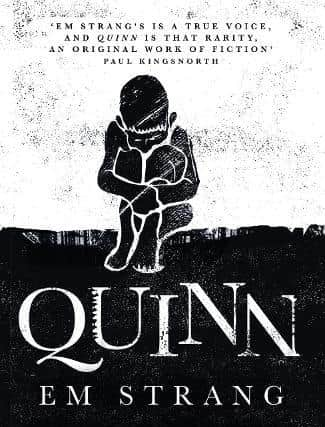Book review: Quinn, by Em Strang
Quinn is a very peculiar, quite remarkable novel. It has one of the rarest qualities in contemporary writing, in that it is a work of genuine depth; with a feeling that it has been hard-won and not just typed out. There is something glorious about reading a book where you have a kind of caesura, and feel the need to re-read the previous pages in case you missed something crucial. “Crucial” seems an apposite word for Quinn, in many different ways.
The eponymous Quinn starts the novel speaking from prison. He has been convicted of a crime, but he is not convinced he committed the crime, or was justly incarcerated for it. It involves the disappearance of Andrea, whom he says he “had to search for… not least because I was the only person who knew where to look”. They had “loved each other all our lives – since we were five or six years old. No, we had imitated love, pretended love, failed and misunderstood love”. The skelfs around reliability start to wince early: “It is true that when I speak, I begin to remember. Or when I remember, I begin to speak. It is a difficult process and a long story”.
Advertisement
Hide AdQuinn’s narrating of his prison time is somewhat compromised. Were there really three black birds that attacked him, or a man with a camera who became a statue, almost an idol? And what does the reader make of the “Stone Man” and its connection to his fantasy that he and Andrea were “like a god and goddess depicted on an alabaster tomb”? (Incidentally, the use of the word “alabaster” is pitch-perfect in that a lesser writer would have said “marble”).


The twist, the nub, of the book is a surprising offer. The mother of Andrea, after years of resentment, bitterness and fury at Quinn, suggests to him a position as her carer on his release. It becomes not just about the possibility of forgiveness, but the potential for redemption: and yet, the reader is still on shifting sands as to what actually happened. They have been forewarned. “It was obvious”, Quinn says, “that so much of this suffering could have been avoided if they had made an effort to unpick the endless stream of hysterical stories that had been woven around her disappearance”.
Forgiveness is a topic I have thought about a lot, and written about a little. My only real conclusion is that it is not easy. The philosopher Jacques Derrida, in one of his typically quizzical paradoxes, wrote that “the only thing that is forgivable is the unforgivable”, and this seems to be the conundrum at the heart of this novel. Is Quinn’s time with Andrea’s mother intended as rehabilitation or a different kind of penance? Her mother is looking for “an act of freedom for myself”, a desire “to make peace with what I can’t change”, which is exactly how Bishop Butler described forgiveness as a means to eradicate resentment. The book dances around these questions with nuance and elegance.
Strang is a poet, and the phrase “a poet’s novel” always seems to carry a patina of suspicion. It need not mean more adjectives than plot. This is a poetic book, not least in its use of repetition. Several phrases toll ominously throughout, from the plangent (“Things have been done that hurt the mouth to speak of”, “Let it be known that I have suffered”) to an eerie echo of “dark blue, almost black” that is applied to many different things. There is also a very poetic sense in which a statement and its opposite are held in suspension. Quinn says, for example, “I am a complicated man. I am an uncomplicated man”. This is incantatory, which seems appropriate for a book rooted in religious ideas. It is also hallucinatory. Several times Quinn states “Five years passed, or the sun and moon had tricked me”, which very effectively unsettles the reader looking for a realist narrative with a neat closure. The time, as a famous Danish prince once said, is out of joint.
There is a note which strikes false in the book. Quinn has published a few stories in small literary magazines and local newspapers, and Andrea’s mother’s rather dislikeable neighbour seems to like tormenting him over his thwarted literary ambitions. The story he recounts has symbolic value within the book (it involves swans, another frequent image), but it could just as well have been a family story or an old legend. Quinn as writer manqué does not really contribute to the overall moral arch of the book. Even Quinn as a failed writer does not make the realities of grief, guilt and regret any less palpable.


Strang’s novel reminded me a great deal of Sebastian Barry’s new book, Old God’s Time, which is similarly dealing with old crimes and smudges the borders between memory, false memory, dream and fantasy. Strang is an exceptionally accomplished writer, and I very much hope this is just the first book by her that I read. It also eludes being generic. I would reckon that any 12 readers would arrive at 12 different conclusions about the “really-ness” of it.
Quinn, by Em Strang, Oneworld, £14.99